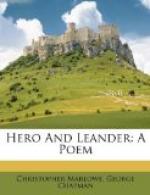|
This section contains 11,341 words (approx. 38 pages at 300 words per page) |

|
SOURCE: Campbell, Marion. “‘Desunt Nonulla’: The Construction of Marlowe's Hero and Leander as an Unfinished Poem.” ELH 51, no. 2 (summer 1984): 241-68.
In the following essay, Campbell argues that to read Marlowe and Chapman's sections of Hero and Leander “as parts of a single whole is to obscure the shape and significance of Marlowe's poem.”
Hero and Leander is conventionally regarded as a fragmented poem, begun by Marlowe and completed by Chapman. Critical interest has centered, therefore, on defining the nature of the two parts and their relationship to one another; but I believe that there is a prior question to be answered, or at least asked. Why is Marlowe's poem seen as incomplete, and why is it read inevitably in relation to Chapman's continuation? My intention in this paper is to contest orthodox readings of Hero and Leander that regard both parts of the poem as dependent on one...
|
This section contains 11,341 words (approx. 38 pages at 300 words per page) |

|


